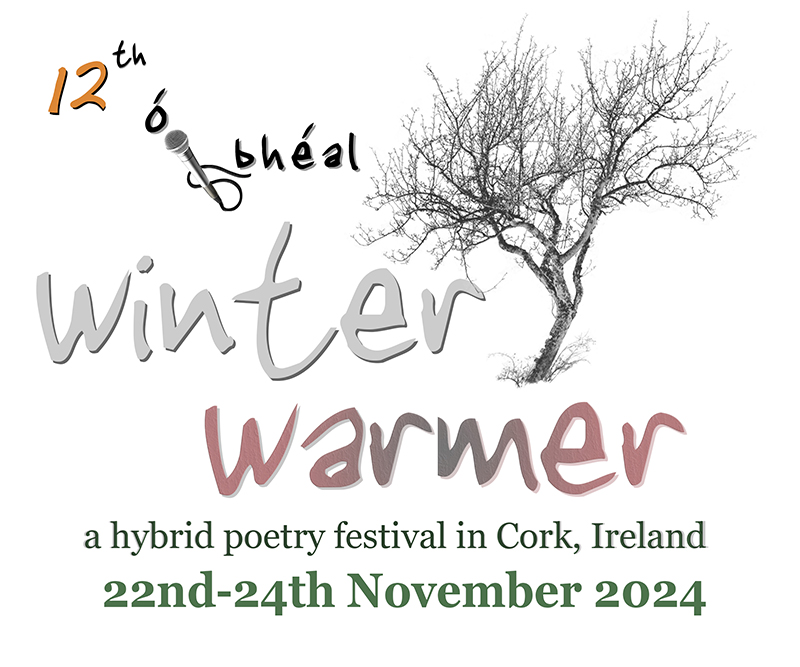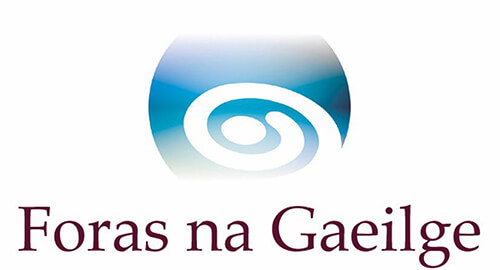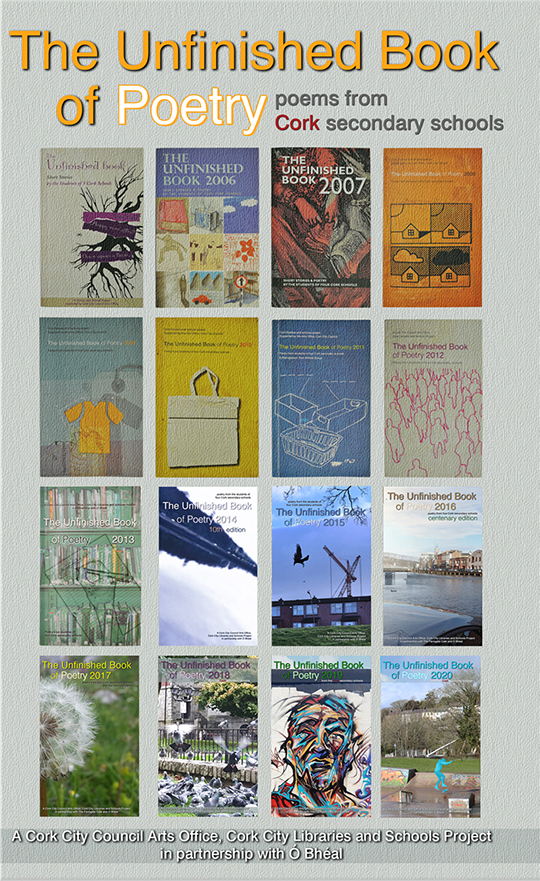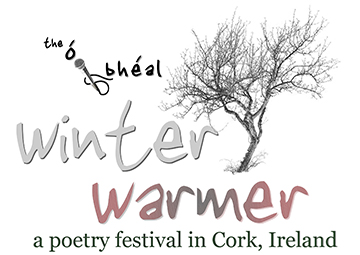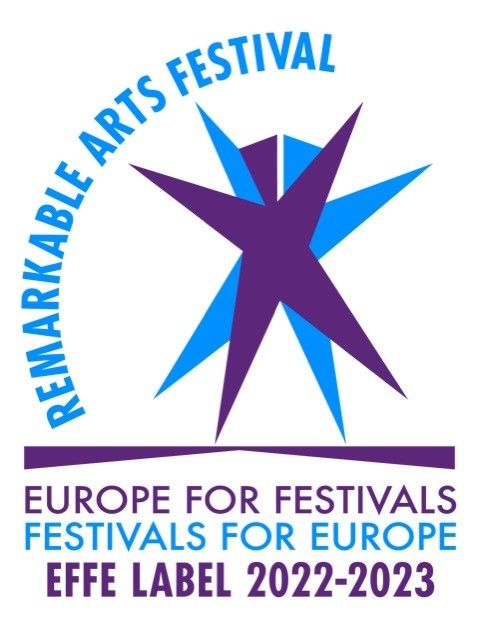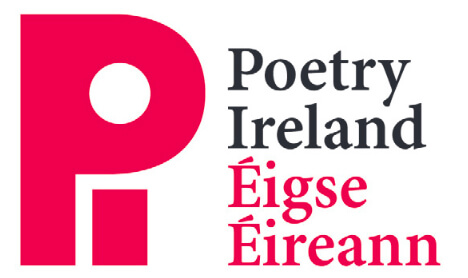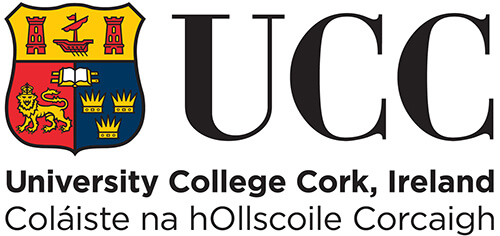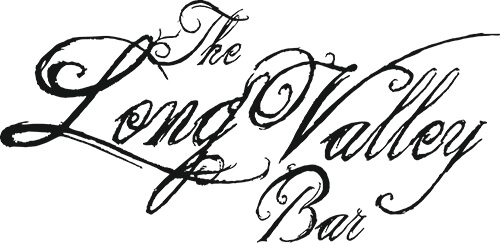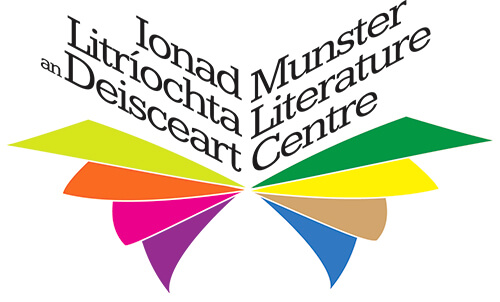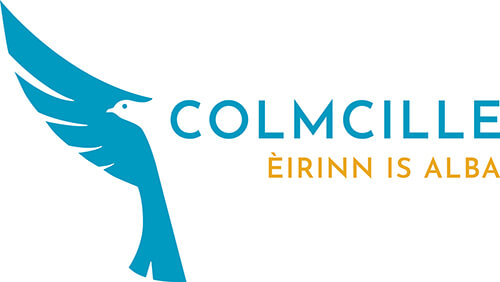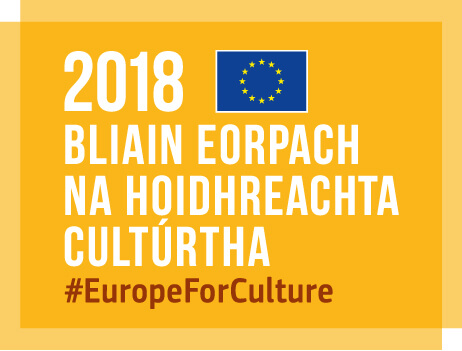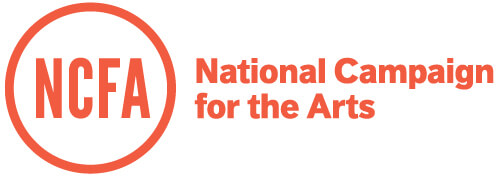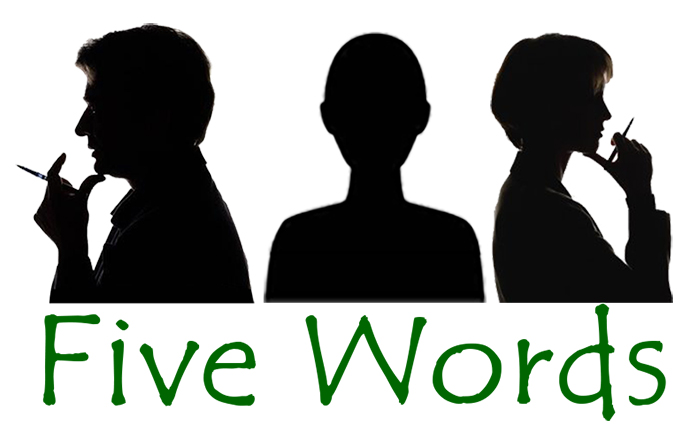
Every Tuesday at 12pm (Irish time) from 9th April 2024 – 28th January 2025, five words will be posted on this competition page. Entrants will have one week to compose and submit one or more poems which include all five words given for that week. The winners & shortlist are announced around the first week of March.
A prize of 750 euros will be awarded to the winner, plus 500 euros for second place and 250 euros for third place. These three, if available will be invited to read at Ó Bhéal’s eighteenth anniversary (hybrid) event, on Monday the 14th of April 2025. Should winners be able to attend in person, then an additional travel fee of 100 euro plus B&B accommodation will be provided for this. The overall winner also receives a physical award, hand-crafted by acclaimed glass artist (and poet) Michael Ray.
The shortlisted poems and winning entry will also be published in Five Words Vol XVIII – the anthology of five word poems to be launched at the same event. A shortlist of twelve poems including the overall winner will be announced by the first week of March 2025.
The five words offered each week for the 12th Five Words competition (2024-25) are sourced from Ó Bhéal’s twelfth year of live Monday evening Five Word Challenges (held during 2018-19). A small, varied selection of additional words are also used due to deletion of duplicates, colloquialisms, etc.
Entry is open to all countries. Poems cannot exceed 50 lines in length (including line breaks), and must include all five words listed for the week.
A modicum of poetic license is acceptable. As long as the original spelling is intact, you’re welcome to extend, pluralise or even split any word to appear across two adjacent words, even if its original meaning becomes altered.
Poems should be newly written, during this 7-day period. There is no limit to volume of entries, although each payment and submission should be made separately.
Submissions carry a 5 euro entrance fee.
Payment should be made via this paypal button before continuing.
Once payment is made, please copy your poem into the completed submission form (one poem per form), and email to
or by post (postmarked by Tuesday at latest) to:
Ó Bhéal
Five Words Poetry Competition
c/o Civic Trust House
50 Popes Quay
Cork
Ireland
For postal entries, please print out and complete the submission form, and post together with your attached poem (on which nothing other than the title and poem appear).
Email entries should only be sent via the above email address, not via the submissions [at] obheal [dot] ie email link on the home page, which is only for non-competition entries, written and performed live during each Monday evening event from words derived randomly by the audience.
Any queries should be directed to info [at] obheal.ie
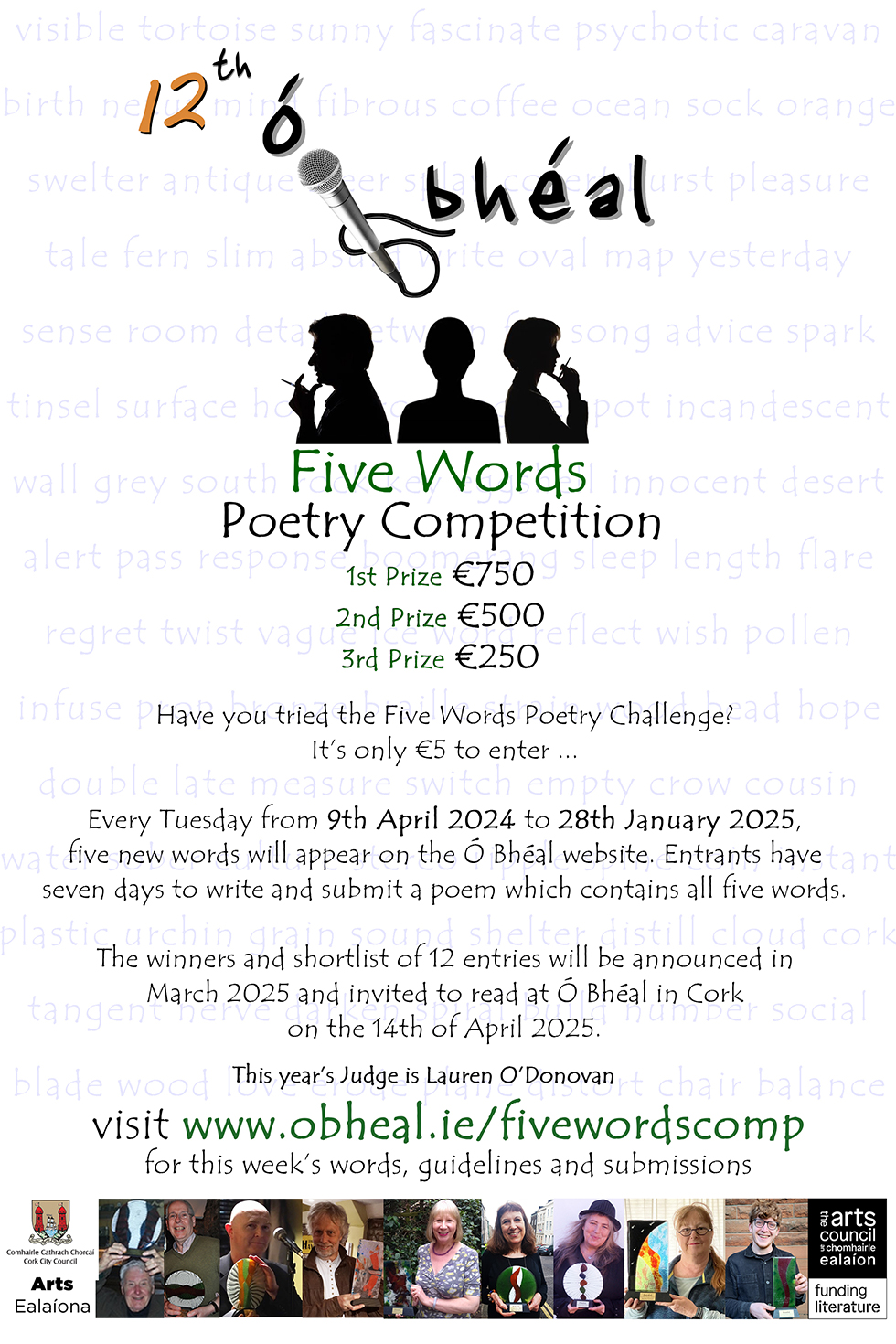
Five Words Vol VII (April 2013 – April 2014)
Five Words Vol VIII (April 2014 – April 2015)
Five Words Vol IX (April 2015 – April 2016)
Five Words Vol X (April 2016 – April 2017)
Five Words Vol XI (April 2017 – April 2018)
Five Words Vol XII (April 2018 – April 2019)
Five Words Vol XIII (April 2019 – March 2020)
Five Words Vol XIV (April 2020 – March 2021)
Five Words Vol XV (April 2021 – March 2022)
| against cartography | by Derek Sellen (England) 1st | |
| Gardening in the Otherworld | by Mary Anne Smith Sellen (England) 2nd | |
| imagine a field | by Laura Theis (England) 3rd | |
| Inheritance | by Alison McCrossan (Ireland) | |
| Storm Glass | by Brian Kirk (Ireland) | |
| self-care für unsichtbare | by Laura Theis (England) | |
| To Be Done Before Anything Drastic | by J.A.Speta (USA) | |
| A Tale for No Tail | by Mary Louise Kiernan (USA) | |
| Out of the Woods | by Kevin Conroy (Ireland) | |
| Rapture | by Marcella Remund (USA) | |
| For Sam Lawler, Who Used His Gun | by Tracy Newlands (Australia) | |
| Leaving Ursa Minor | by John D. Kelly (N.Ireland) |

against cartography by Derek Sellen
“I thought of the Hopkins poem ‘Inversnaid’ when I read this, and of Brian Friel’s ‘Translations’; a championing of what is wild and wayward, what is not to be confined inside the grid of maps and by extension inside a reductive frame of reference. A beautifully extended and mastered metaphor breaks free into a hymn of praise, a celebration of ‘unmapped existence”. Masterfully handled.”
Gardening in the Otherworld by Mary Anne Smith Sellen
“The sheer exuberance of the words, the flow of attention and the interplay between what is seen and what thought the seen thing evokes, these things delighted me. Derek Jarman’s garden in the shadow of Dungeness power station was, among other things, a celebration and an act of defiance. The poem does him, and the garden, a beautiful justice.”
imagine a field by Laura Theis
An adventurous and persuasive invitation to the reader’s imagination — and a corrective to the rather trite clichés of contemporary journalism, a rebuke to the idea that humankind is somehow outside nature. We, too, can be ‘free things’, and if we trust our imaginations, as this poem does, we can ‘fit right in’”
| Lighthouse / Mother | by David Ross Linklater (Scotland) 1st | |
| Walking alone | by Alison McCrossan (Ireland) 2nd | |
| Terms of Endearment | by Glyn Matthews (England) 3rd | |
| Shive | by David W Evans (Jersey) | |
| Gifted | by Laura Theis (England) | |
| After Eunice | by Jill Munro (England) | |
| Scut | by John Baylis Post (England) | |
| Fump | by Phoebe Colby (Canada) | |
| It Isn’t Inevitable, Just Likely | by Dante Miller (USA) | |
| In praise of liminality | by Gabrielle Deakin (Spain) | |
| The University Of Brattleboro And The Uncluttered Table | by Rolf Parker-Houghton (USA) | |
| Then There Was Only One Foetal Heartbeat | by Mandy Beattie (Scotland) |

Lighthouse / Mother by David Ross Linklater
“This stunning poem stopped me in my tracks. I am obsessed with hyphens at the moment and the use of one in the title was so arresting and unexpected. The poem itself is so beautifully written and I was utterly impressed by how the poet included unusual terms like ‘nuckelavee,’ ‘horneri’ and ‘isthmus’ in the poem so naturally and eloquently. This is a deep, dark, and mysterious poem – unknowable yet utterly familiar, just like a mother.”
Walking alone by Alison McCrossan
“This brilliantly written poem is full of quiet, delicate moments that belie the sinister undertones that follow, ‘I was down by the clear water, watching minnows/dart over stones. Taking comfort away from teenage taunts.’ The imagery is unforgettable and perfectly described, the ending in particular stayed with me, ‘How a lone starling flitted in/and pinched a minnow in its beak./How the other starlings wouldn’t be far behind.’”
Terms of Endearment by Glyn Matthews
“This poem opens with the lines,
From my bed I heard my father
enter in a drunken rage,
beat midnight to a pulp
as the juke-box played
I was particularly taken by the brilliant, ‘beat midnight to a pulp,’ and the rest of the poem lives up to this disturbing and evocative image. The introduction of the budgie is a stroke of genius and brings an originality and freshness to this poem that is all its own, ‘and wrote ‘Joey’ on a lolly-stick.’”
| Caught | by Marcella Remund (USA) 1st Place | |
| Finding Nero | by David W Evans (Jersey) 2nd Place | |
| Bleeding Kit | by Peter Arvan Manos (USA) 3rd Place | |
| …stream… | by Peter Longden (England) | |
| Small Blues | by Cindy Botha (New Zealand) | |
| Bathing Mother | by Marcella Remund (USA) | |
| A Barrow From The Marketplace | by Chris Reed (New Zealand) | |
| Lines from the lateral canthus | by Rosemary Norman (England) | |
| Sleep Lessons From Birds | by Laura Theis (UK) | |
| The Complete History of the Lyric | by Kyle Vaughn (USA) | |
| Foregone Conclusions | by Dean Gessie (Canada) | |
| With Blackbirds and Pirates | by Eoin Hegarty (Ireland) |

Caught by Marcella Remund
“Arriving at the winning order has more to do with taste than objective judgement, a matter of what seduces the eye and the ear more than what satisfies a set of criteria – and on another day, one suspects, or in a different mood, other poems might take one’s fancy. But ‘Caught’ I found irresistible on many readings. It is a beautifully achieved poem. It has a toned perfection both of voice and stanzaic muscle. The repetitive use of the imperative provides an efficient little engine to propel the poem through our world of danger and damage, resonating at times with perennial fears, elsewhere suggesting recent circumstances. And then, almost unnoticed, ‘forget’ mutates into ‘forgotten’. How smart is that! Never I suspect has ‘silk’, that last word, been used in the context of such forlorn constraint.”
Finding Nero by David W Evans
“By contrast, ‘Finding Nero’ is a poem of exuberant excess, freewheeling through that infamous life while giving its outsize subject a contemporary speaking voice, one we overhear in all its delusional self-obsession — in its petulance, pettiness, cruelty, in its murderous insouciance. At the same time, this high-flying, often comical monologue is always tethered and secured by demotic phrasing and grounding detail — ‘perfection mixed with god-dust’, ‘they’re big on myth these punters’, ‘pool-eyed Narcissus’. Is the maniacal narcissism, I wonder, specifically pertinent in our current world? “
Bleeding Kit by Peter Arvan Manos
“I was immediately mesmerized by ‘Bleeding Kit’ – very much a sad gloss on our age. It’s a noisy poem in the best sense – with words and sounds clashing and ricochetting: ‘quids’ against ‘quid-pro-quos ‘, ‘blunders’ into ‘blunderbusses’, ‘flintlocks’ and ‘bump stocks’, culminating with the off-rhyme closure of ‘buzzwords’ and ‘buzzards’. Executed high-tempo as a single sentence, the effect is percussive and abrasive and in keeping, both in sound and image, with its disturbing subject-matter.”
| A Rook Longs For A Badger | by Sinéad McClure (Ireland) 1st Place | |
| The Chagallisation of Joan | by Jill Munro (England) 2nd Place | |
| what you meant when you promised we’d go to the circus |
by Laura Theis (UK) 3rd Place | |
| Held Back | by Sinéad McClure (Ireland) | |
| Both Ends | by Tamara Miles (USA) | |
| In His Jacket Pocket | by Jane Salmons (England) | |
| Crossing | by Eóin Condon (Ireland) | |
| Lightfastness | by David Evans (Jersey) | |
| Girl Missing | by Jane Salmons (England) | |
| Else | by Tamara Miles (USA) | |
| Inferred and Implied | by Glen Wilson (Northern Ireland) | |
| Night Flight | by Sarah Salway (UK) |

A rook longs for a badger by Sinéad McClure
“From the nearly 800 entries, I created a long-list of about 100 poems. All fine pieces. All submitted within a week of their crafting. I wanted poems which gave no hint of their genesis, no glimmer of the short time-frame they were conceived in, or of the five words that prompted them. Poems that really were poetry. About fifty entries fitted that description. They all deserved to be shortlisted. Many could have won. But I chose ‘A Rook longs for a badger’ because the poem so neatly, so lyrically addresses my politics. They are the only politics I believe we need to be exploring now. It is ever shocking to me how human-centric we are. How little nature exists in our collective thinking—even the thinking of poets. For years she’s been a sideline in the competitions I’ve judged; so few writers have given her even a glimmer of regard. Here’s a poet who isn’t just writing about nature, she’s thinking as the creatures do. This type of thinking is the moral task of our times. But we won’t get there by being lectured; we need to be seduced. How beautifully A rook longs for a badger calls come hither.”
The Chagallisation of Joan by Jill Munro
“Many quirky delights returned me over and again to The Chagallisation of Joan. Many of its lines don’t quite make sense in the same way that Chagall’s images reveal an other, altered reality, which doesn’t quite make sense, but surely improves our lives. The poem leaves me standing before a stained-glass image, taken into its vibrancy to become ‘part of this glassy patchwork, to be awash in a multi-coloured quilt’. I was reminded of once standing in St Carthage’s Cathedral in Lismore, looking up at the Burne-Jones window-glass, and being similarly transformed. The liminal metamorphosis that artworks can engender is beautifully, memorably captured here.
what you meant when you promised we’d go to the circus by Laura Theis
“I always feel a judge’s final winners are ultimately only personal choice. Any of the final twenty poems in my shortlist were well enough crafted to win the competition. But the ones I picked were the poems that resonated most with me. How well I recognize the territory of disappointed romance in what you meant when you promised we’d go to the circus. But what I love is the unique way this universal experience is portrayed. Failed love tends to look the same in poems, but this meander through circus metaphor addresses the pain of heartbreak, and provides leaps of imagination which transform the hurt and gild it with significance.

| Betty Fox is Skipping | by Derek Sellen (England) winner |
| Evolution | by Cliona O’Connell (Ireland) highly commended |
| Automaton | by Rosemary Norman (England) highly commended |
| Father’s Day | by Janice Bethany (USA) |
| Wise and Luminous | by Ada Volynska (Ukraine) |
| Smoke Flares, Pyro Prayers | by Lucy Holme (Ireland) |
| The Boat Crane | by Sharon Phillips (England) |
| 6am. River. Girl. | by Fiona Ritchie Walker (England/Scotland) |
|
To Paint Death as The Mountain Pine Beetle |
by Michele Ring (France) |
|
Bottled Lines, Excellent Spirits |
by Ada Volynska (Ukraine) |
|
A Small Bee Came to Rest Upon My Hand |
by Margaret McCarthy (Ireland) |
| La Rue des Touettes | by David W Evans (Jersey) |

Betty Fox is Skipping by Derek Sellen
“This poem’s appeal is in its simplicity and cinematic quality. Each image evokes a bygone era. I always enjoy learning something new, and had to Google Betty Fox to find out more about the Sky Dancers, known as the world’s greatest aerial act. It’s also refreshing to come across a poem that has no trace of an ‘I’ voice.”
“This poem carried itself beautifully through a sequence of triplets ending in a quatrain, the rhythmic qualities and slant rhyme brought this poem spinning to the top of the pile.”
Evolution by Cliona O’Connell
“The various geographical landscapes of this poem give it a sense of spaciousness. I particularly liked the unexpected use of the adjective ‘spiky’, which opens up the mind to the evolution, not just of humans, but of plants, trees, every living thing.”
“An arid poem full of stark images. A great example of how to slip five words seamlessly into the fabric of the poem.”
Automaton by Rosemary Norman
“A significant element of a poem is its title. This one introduces the notion of a robot attempting to emulate the living. The strange syntax could conceivably have been generated by a computer. The poignant effect is to hint at a future when forests and birds no longer exist and have to be simulated.”
“So close to claiming first prize, this small tightly formed poem with its ingenious repetitions pulled me into the whirl and jerk of automata.”
| Monolith | by Mary Anne Smith (England) winner |
| The Idea of Snow | by by Jenny Pollack (Australia) highly commended |
| My grandmother goes to the temple |
by Sophia Li (USA) highly commended |
| The Lyric Impulse | by Steve Xerri (England) highly commended |
| Omens | by Joan Gooding (England) |
| Detachment | by Geraldine McCarthy (Ireland) |
| Peckham Flaneur | by Giles Constable (England) |
| La Llorona / Weeping Woman |
by Derek Sellen (England) |
| What you woke to | by Steve Xerri (England) |
| Karst Landscape | by Gillian Laker (England) |
| Vardo | by Jill Munro (England) |
| Nexus | by Tamara Miles (USA) |

Monolith by Mary Anne Smith
“No prior knowledge of the monument described is necessary to enjoy this apotropaic poem, which is “stonelike” in its sparse form that sparingly employs end-rhyme and assonance to great effect. The short-line structure gives a sense of peering hard at the surface, or simultaneously peering up into the sky. It escapes being maudlin, like many memorial poems, by virtue of the sense of distance created between the sculptor/mother and lost son. Nevertheless, the poem is an uplifting testament to the power of art to endow the seemingly absurd and uncontrollable events of life with meaning and context.”
The Idea of Snow by Jenny Pollack
“This poem drifts effortlessly from opulence to humour. Its onomatopoeic line structure and assonance build up a vivid idea of snow for the reader before being punctured by the epigraph. Each word is given its weight and the result is reminiscent of individual snowflakes.”
My grandmother goes to the temple by Sophia Li
“The river-like pouring out of poetic prose, as a babbled prayer, comes full circle in the penultimate line before a bathetic finale. The use of matter-of-fact language and repetition accentuates the complex daily challenges of the grandmother and speaker’s lives, giving way to a sensuality in the description of the material culture of prayer in which the grandmother allows herself to indulge.”
The Lyric Impulse by Steve Xerri
“This energetic and melodic poem almost reads as a translation of a Latin lyric into a rich vernacular, reinventing the classical legend of Orpheus’s head floating downriver after he was ripped apart by female fans. En route down the rubbish-filled 21stcentury river, complete with houseboats, the head serves as a powerful image of a poet derailed, the ultimate bard no longer able to sing, speak or play despite finding in this worldly setting his greatest inspiration yet.”
| Ptarmigan | by Jill Munro (England) winner | |
| Among Starlings | by Margaret McCarthy (Ireland) highly commended | |
| A Dream of my Dead Grandmother | ||
| in the Modern Art Museum | by Derek Sellen (England) highly commended | |
| Disciplining the Modern Satyr | by Mary-Jane Holmes (England) | |
| Nothing To See | by Giles Constable (England) | |
| How We Are | by Ted O’Regan (Ireland) | |
| Writing for the Ó Bhéal | ||
| Open-Mic | by Jim Crickard (Ireland) | |
| Amber | by Ted O’Regan (Ireland) | |
| Reindeer Moss | by Tamara Miles (U.S.A.) | |
| Every Sunday Ever | by Kirsten Irving (England) | |
| Centenary | by Ted O’Regan (Ireland) | |
| My Mother’s Birthplace | by Tamara Miles (U.S.A.) | |

Ptarmigan by Jill Munro
“There are beautiful musical lines in this piece, which weaves an odd, enchanting myth around the bird. A really well-crafted, memorable little fable.”
“The poem weaves, both gently and robustly, the journey of adolecence through the
form of this colour-changing bird.”
Among Starlings by Margaret McCarthy
“Powerfully empathetic, this poem uses unusual language to convey the sense of loss felt by the cows. The opening line in particular is arresting, as is the evocation of lowing.”
“Reading this poem I become Starling.”
A Dream of my Dead Grandmother in the Modern Art Museum
by Derek Sellen
“Very unusual piece, which weaves the surreal poignancy of loss through a vivid cascade of images in a highly original way. The use of the bewildering array of images, some grotesque, some classical, seems to work in a really affecting way to interrogate the fractured thought processes of grief.”
“This poem does what it says on the tin: It’s an extremely well made tin.”
| Identifications | by John Baylis Post (Ireland) winner |
| Milk | by Siobhan Campbell (Ireland) highly commended |
| The Safety | by Tamara Miles (U.S.A.) highly commended |
| Eve | by Siobhan Campbell (Ireland) |
| LOVELOCKS | by Jane Boxall (U.S.A.) |
| Only Connected | by Margaret McCarthy (Ireland) |
| Perspective | by Ted O’Regan (Ireland) |
| THE ZOMBIE-MAKER | by Derek Sellen (England) |
| Minor Deities | by Tamara Miles (U.S.A.) |
| A fickle god | by Margaret McCarthy (Ireland) |
| STITCHES | by Jane Boxall (U.S.A.) |
| The Buttonhole | by John D. Kelly (Northern Ireland) |

Identifications by John Baylis Post
“The poem itself is a cabinet of curiosities, and our eye is directed towards a myriad of stray details – but the emotional resonance is most powerfully felt with the introduction of the St Christopher and Lucy’s name. Although the last line tells us: ‘There’s no label on Lucy’s St Christopher. She has no story’, the poet has given her one. An absolutely wonderful poem, and a worthy winner.”
“Memory and history are corruptible and therefore destined to be fragmentary and, eventually, almost enigmatic. Memory is the micro-history of the individual, and like the history of the wider community it sheds its ghosts to haunt whatever it has touched. This poem deftly examines these issues by way of the museum of the shoebox and the museum of the heart.”
Milk by Siobhan Campbell
“Powerfully empathetic, this poem uses unusual language to convey the sense of loss felt by the cows. The opening line in particular is arresting, as is the evocation of lowing.”
“Here, language and concept almost graft the mind of the reader into the poem itself, until we are not simply reading, but experiencing the poem’s narrative from the inside. A wonderful piece, and expertly done.”
The Safety by Tamara Miles
“A rhythmic narrative, convincingly told. I particularly loved the line, ‘why for love or other grown-up hobbies…’ This is intense hero-worship, vividly remembered and evoked.”
“This poem demonstrates a universal: how, in our overeager desire for friendship or kinship, we can sometimes damage any hope of it by neglecting the interests of those with which we seek a bond. In the final analysis, there’s a self-judgement here that impinges on the reader and reflects back our own past complicities.”
| The Dancehall on the Summit of the Bloodiest Head of the Twenty Six Headed Giant | by John W. Sexton (Ireland) winner |
| Tuesday on a Fulcrum | by Beth Somerford (England) highly commended |
| Commuter | by Janet Lees (England) highly commended |
| The Night of the Nightjar | by Mary Anne Smith (England) |
| Tribes | by Pam Szadowski (England) |
| An awful hush | by Jenny Pollack (Australia) |
| Chinese Zodiac: Year of the Fire Monkey |
by Tamara Miles (formerly Gantt) (U.S.A.) |
| An unread novella in a charity shop |
by Janet Lees (England) |
| Igloo | by Shirley Bell (England) |
| Ragwort | by Derek Sellen (England) |
| A Coin in the Soft Machine | by John W.Sexton (Ireland) |
| Sky, an Open Window | by Tamara Miles (formerly Gantt) (U.S.A.) |

The Dancehall on the Summit of the Bloodiest
Head of the Twenty Six Headed Giant
by John W. Sexton
“The Dancehall is a worthy winner, a chilling, surreal fairytale written with great skill. Its imagery will linger in your imagination long after reading.”
“The transformation of a giant’s head into a dance floor for the passengers on a wandering airship is never abandoned throughout this fantastical poem. Its skilfully engaging storytelling style, coupled with a sophisticated use of prosodic tools provides us with a complete poetic experience.”
Tuesday on a Fulcrum by Beth Somerford
“An atmospheric poem that wonderfully captures a day in the life of a seaside town, where low light hovers over its slow-moving residents and only a gang of seagulls
break the torpid air.”
“Its formal construction and gentle cadence tells a day’s story from a singular point of view. Looking down over the town of Hanover we are guided through that day’s dreary but beautiful passing, aided by the poems finely balanced, delicate descriptiveness.”
Commuter by Janet Lees
“In ‘Commuter’ the rhythm pulses with urgency, that of the train and the hands tapping on a laptop, like, ‘two panicky sand crabs far from shore.’ ”
”
“As if we have engaged all our own inventions to somehow follow the unspecified human project, this poem reveals how modernity is not complex at all, only multiple versions of us “like panicky sand crabs – always digging for something.” The conceit of the commuter on the train is not original, but in this case is profoundly achieved.”
| Survivor | by Derek Sellen (England) winner |
| Sonnet in B Major | by Afric McGlinchey (Ireland) highly commended |
| Home Cooking | by Adannaya Igwe (UK) highly commended |
| Saved | by Liz Smith (England) |
| Breakfast | by Sheena Blackhall (Scotland) |
| At the Hair Clinic | by Derek Sellen (England) |
| The Snooze Button | by Margaret Mc Carthy (Ireland) |
| The Sectioning | by Bernadette McCarthy (Ireland) |
| I Coin a Line | by Mary Fahy (Ireland) |
| The Stereogram | by Anthony Scott (England) |
| Black Mountain Rebel | by Tess Sheridan Adams (Ireland) |
| False North | by John W. Sexton (Ireland) |

Survivor by Derek Sellen
“‘Survivor’ is a worthy winner, a richly detailed vignette than transcends anecdote, gesturing toward the selfishness and irresponsibility of art and artists with a vivacity and colour worthy of Gauguin himself.”
“Within this poem, a famous artist’s model is transformed from passive object into the subject of her own story. Not only is ‘Survivor’ well executed in craft, but it displays compassion and depth of inquiry necessary to lift a poem to the place where it will live actively in the reader’s imagination.”
Sonnet in B Major by Afric McGlinchey
“‘Sonnet in B’ is a tricky, shifting kaleidoscope, its shape and significance altering with each reading. It works its spell by rhythm rather than narrative, its beguiling fragmentary phrases hinting toward truths that are never quite revealed. ”
“This poem is bold, brash and brave! It operates outside the narrative tradition, making its own kind of logic that is utterly compelling. Once you reach the end, you’ll read it again and again to unlock its mysteries and stay a while longer in its lovely sense of play.”
Home Cooking by Adannaya Igwe
“Home Cooking’ is an almost unbearably moving account of loss and identity, of an old and ‘deep-rooted’ voice forsaken and recovered. ”
“There is nothing that evokes ‘home country’ for the ex-pat more than home cooking! Rich in detail, the reader’s taste buds are tantalised while the complexity of identity is considered. The voice in this piece is authentic and moving, letting the page express an experience which is difficult to put words to in everyday life. ”
| Old Maps and Books | by Don Nixon (England) |
| Fado in a Lisbon Bar | by Don Nixon (England) winner |
| Gipsy Girl | by Eithne Reynolds (Ireland) |
| The Magician’s Hat | by Linda Mills (USA) |
| Matinée Idol | by Richard Hawtree (Ireland) |
| Postcard | by Joy Howard (England) |
| A boy of six thousand parts | by Janet Lees (England) highly commended |
| Palimpsest | by Janet Lees (England) |
| Frozen moment | by Afric McGlinchey (Ireland) highly commended |
| Life on Mars | by Colm Scully (Ireland) |
| The Choice | by Tom Dredge (Ireland) |
| At the Banquet | by Máire Wren (Ireland) |

by glass artist
Michael Ray























